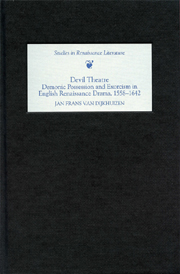CHAPTER TWO - EXORCISM AND THE POLITICS OF RELIGION
Published online by Cambridge University Press: 12 September 2012
Summary
During the possession controversies of the late sixteenth and early seventeenth centuries, a range of factions within the English Church were united in their condemnation of exorcism. Rituals of exorcism were attacked by Arminian conformists such as Samuel Harsnett and Richard Bancroft, by Calvinists such as William Perkins, and by moderate Puritans such as George Gifford and Richard Bernard. The unease about the ritual among these writers can partly be explained by the fact that the ritual was practised both by Catholic priests and radical Puritan ministers. Katharine Maus has noted that from a conformist point of view, ‘papists and sectarians could seem to be allied with one another despite their contrary doctrinal premises; they were even accused of collaborating with the hope of toppling the English political and ecclesiastical system.’ Rituals of exorcism form an apt illustration of Maus' observation, since, according to conformist authors, they provided Catholics and radical Puritans alike with a powerful means of religious propaganda.
The rejection of exorcism, in other words, was not in the first instance inspired by a detached scepticism towards matters demonological, but by politico-religious concerns. For Samuel Harsnett, Catholic rituals of exorcism were designed to draw people away from true, Protestant religion, and from allegiance to their sovereign.
- Type
- Chapter
- Information
- Devil TheatreDemonic Possession and Exorcism in English Renaissance Drama, 1558–1642, pp. 89 - 152Publisher: Boydell & BrewerPrint publication year: 2007



